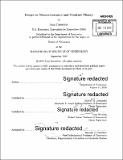Essays on macroeconomics and contract theory
Author(s)
Passadore, Juan
DownloadFull printable version (8.835Mb)
Other Contributors
Massachusetts Institute of Technology. Department of Economics.
Advisor
Robert M. Townsend and Ivan Werning.
Terms of use
Metadata
Show full item recordAbstract
This thesis studies how contracting frictions affect the outcomes that the public sector or individual agents can achieve. The focus is on situations where the government or the agent lacks commitment on its future actions. Chapter 1, joint work with Juan Xandri, proposes a method to deal with equilibrium multiplicity in dynamic policy games. In order to do so, we characterize outcomes that are consistent with a subgame perfect equilibrium conditional on the observed history. We focus on a model of sovereign debt, although our methodology applies to other settings, such as models of capital taxation or monetary policy. As a starting point, we show that the Eaton and Gersovitz (1981) model features multiple equilibria-indeed, multiple Markov equilibria-when debt is sufficiently constrained. We focus on predictions for bond yields or prices. We show that the highest bond price is independent of the history, while the lowest is strictly positive and does depend on past play. We show that previous period play is a sufficient statistic for the set of bond prices. The lower bound on bond prices rises when the government avoids default under duress. Chapter 2, joint work with Yu Xu, studies debt policy of emerging economies accounting for credit and liquidity risk. To account for credit risk we study an incomplete markets model with limited commitment and exogenous costs of default following the quantitative literature of sovereign debt. To account for liquidity risk, we introduce search frictions in the market for sovereign bonds. In our model, default and liquidity will be jointly determined. This permits us to structurally decompose spreads into a credit and liquidity component. To evaluate the quantitative performance of the model we perform a calibration exercise using data for Argentina. We find that introducing liquidity risk does not harm the overall performance of the model in matching key moments of the data (mean debt to GDP, mean sovereign spread and volatility of sovereign spread). At the same time, the model endogenously generates bid ask spreads, that can match those for Argentinean bonds in the period of analysis. Regarding the structural decomposition, we find that the liquidity component can explain up to 50 percent of the sovereign spread during bad times; when the sovereign is not close to default, the liquidity component is negligible. Finally, regarding business cycle properties, the model matches key moments in the data. Chapter 3, studies the implications of reputation on equilibrium multiplicity in a model of sovereign debt. These models can exhibit multiple equilibria. In the worst equilibrium the government is in autarky. However, in reality, we do not observe the autarkic solution. Motivated by an apparent disconnection between theory and reality, I characterize a lower bound on the utility that the government can obtain for any positive probability that the government is from a commitment type that always repays debts. Chapter 4, joint with Ignacio Presno, studies the optimal risk sharing contract between a risk neutral money lender and an agent that faces Knightian uncertainty about the distribution of her endowment and cannot commit on future transfers. We find that in the optimal contract model uncertainty contributes to increase consumption of the agent over time independently of which shocks have been realized. This differs qualitatively from the case without Knigthian uncertainty.
Description
Thesis: Ph. D., Massachusetts Institute of Technology, Department of Economics, 2015. Cataloged from PDF version of thesis. Includes bibliographical references (pages 123-129).
Date issued
2015Department
Massachusetts Institute of Technology. Department of EconomicsPublisher
Massachusetts Institute of Technology
Keywords
Economics.